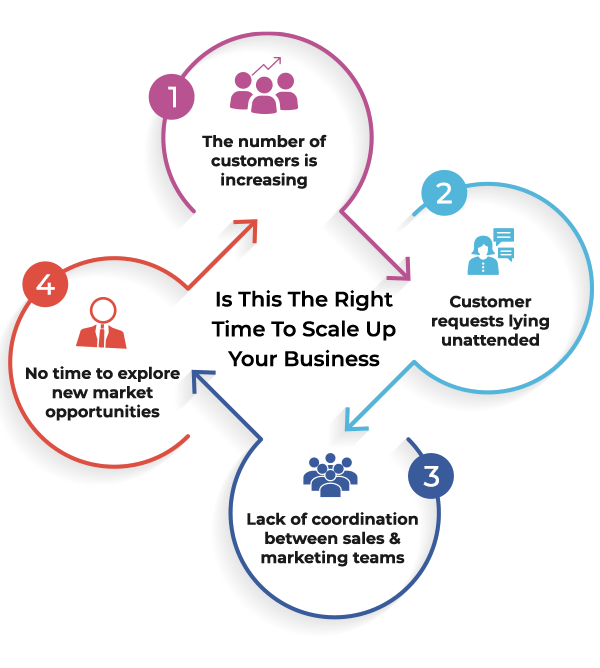Scaling up of a business process is based on strategies, which help a company increase its revenue without making any substantial investments. Businesses scale up to identify niche customers and set up new sales milestones to increase revenue.
If you are planning to expand your business, remember to identify your strong points that puts your product or service at higher alter. Also, has the time really come to upgrade your business processes? Let’s find out.
Is This The Right Time To Scale Up Your Business
When you start a business, the team might be small, and technology deployed for automating tasks would be minimal. However, there would be a time when the business gets ready to scale itself up with more team members and greater deployment of technological as well as software support.

Sign 1: The number of customers is increasing
Startup scaling their business should see if there are customers willing to serve as their buyers. What number exactly is the total of these customers doesn’t matter. All that matters is you have customers on board that need to be managed for such information as managing client information, purchases, buying history, pending amounts and requests. As this number further increases, so does the need for scaling up of a business.
Sign 2: Customer requests lying unattended
Is your business struggling with keeping customers happy? If the answer is yes, then you need to start investing for improving customer service. You need to be aware as a business of your customer’s pain points and once your business is able to do this, notice your business scale up immediately.
Sign 3: Lack of coordination between sales & marketing teams
Is your sales and marketing teams on the same page? There needs to be more communication between the two teams wherein the two can work together in increasing the conversion rate. If you are sensing the friction between these two teams regarding lead quality, sales approach, etc. it’s time to scale up your business.
Sign 4: No time to explore new market opportunities
Are your competitors coming up with new functionalities to attract more customers every other day? Maybe, your existing process is keeping you too occupied to think of better expansion plans. It’s time to automate your customer relationship management process with CRM to focus more on business scale up.
How to Scale Up A Business Smartly with CRM
Marketing metrics, task reminders, email templates and lead management are key modules of an operational CRM application. But before you implement CRM software for your business, adopt these steps to ensure smart technology adoption.
Step 1: Understand what your customers want
Customer support and business prosperity go together. You can easily connect the CRM system with other marketing tools available to you such as emails, social media platforms, public forums, etc. to check what a customer really wants. Or how has the customer’s response been so far about the new product and service.
Step 2: List down the pain points of your teams
Marketing and sales operations once automated reduce the time spent on day-to-day mundane tasks. Still there would be unaddressed issues for which CRM solutions can prove quite effective. These pain points may be linked to purchasing patterns, optimisation of marketing strategies or addressing customer’s issues.
It’s important to identify the pain points of different teams to utilise operational CRM solutions to your advantage and ensure better collaboration.
Step 3: Create your internal team of CRM advocates
Creating an internal team of CRM advocates is a critical business scaling up strategy used by businesses. This internal team would be multitasking in nature and help you fulfill core implementation tasks. CRM advocates are those tech-savvy employees who can help in making the smooth implementation of CRM solution possible in your company.
Step 4: Evaluate different CRM options
To begin with, you can take the demo or free trial version to check for the software’s feasibility to your business. Also check whether you want to go with the cloud support or on-premise deployment. This is another important feature to consider while evaluating the best CRM software to scale up your business.
When it comes to customization, try checking if there are specific user plans available. Because this way it would be possible for you select a solution that best fits your specific requirements.
Step 5: Ensure hassle free implementation
For the hassle-free implementation, create a configuration plan for identifying the data that needs to be rerouted to the operational CRM application. Once this configuration plan is ready, all data transfer process would be smooth and accurate. Also, try involving each team member of your entrepreneurial venture for feedback or suggestions.
Suggested Read: What is Operational CRM: Uses, Benefits, Features
Step 6: Identify CRM integration points within your existing process
CRM cannot function as a separate work system. It should integrate with other systems to streamline your company’s daily business operations. Marketing solutions, accounting platforms, ERP applications, HR software or even web forms, make a list of all integration points within your business.
Somya is one of the most experienced technical writers in the team who seems to be comfortable with all types of business technologies. She is a sensitive writer who ensures that businesses are able to find the right technologies through her writings. She would leave no stones unturned... Read more






























